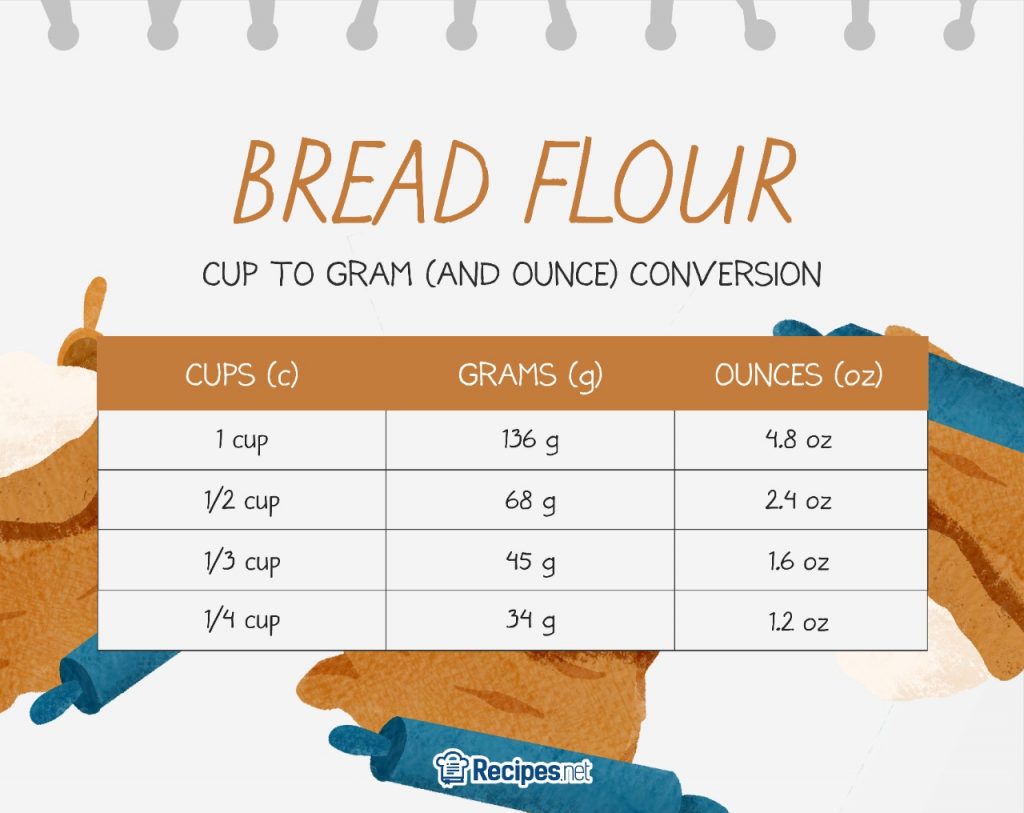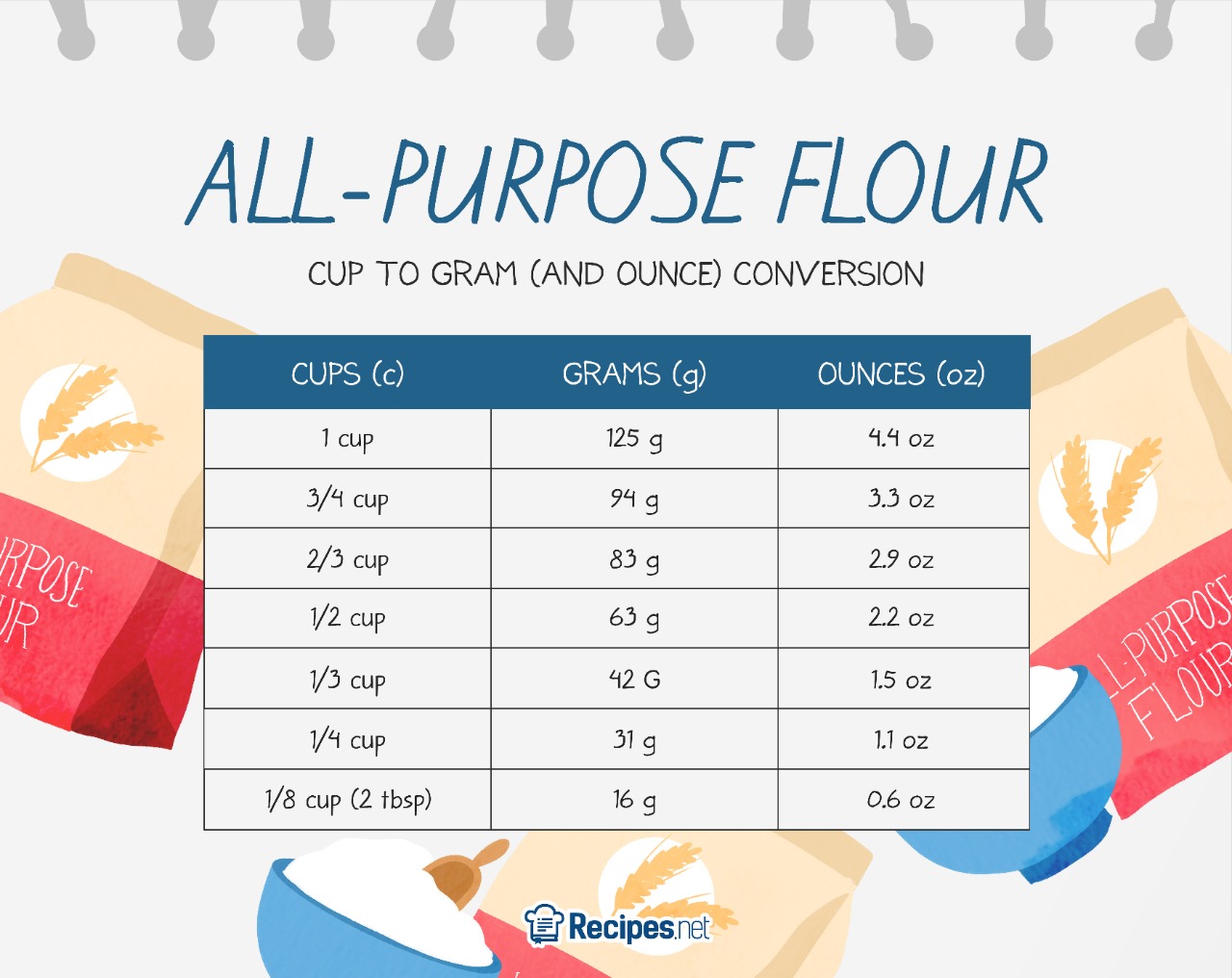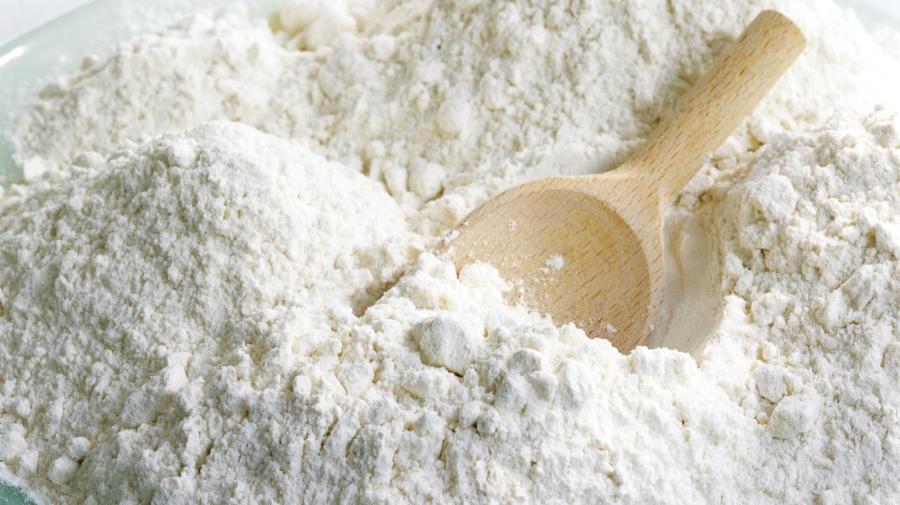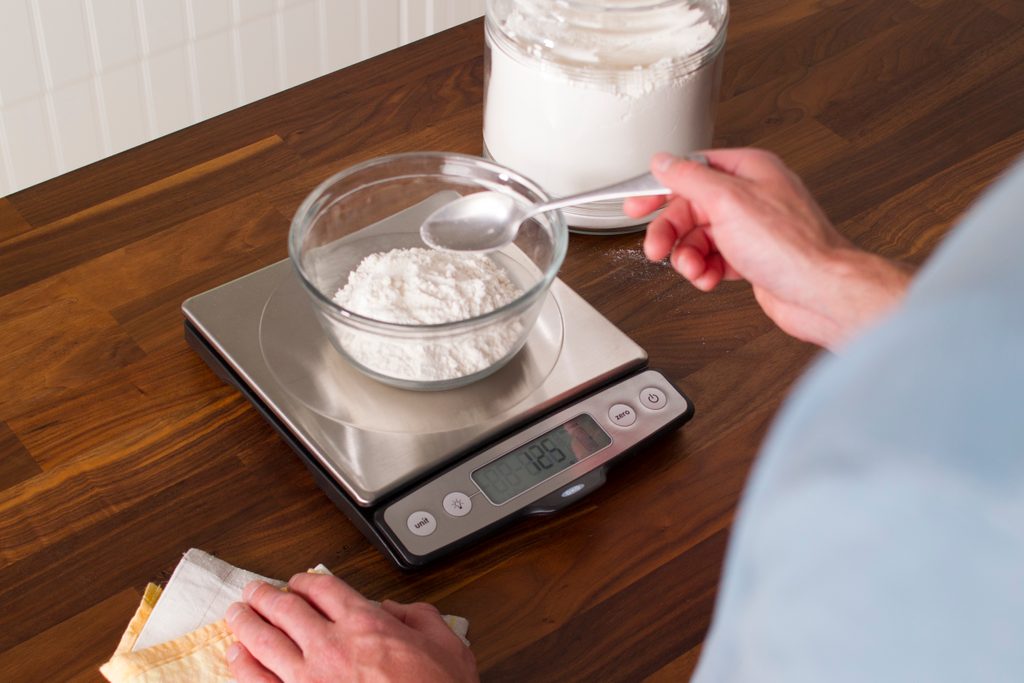
Grams to Cups Guide For Baking (With Conversion Chart!)
How many cups are 1 kilogram? 1 kilogram equals 4 1/8 cups water. Please note that kg and cups are not interchangeable units. You need to know what you are converting in order to get the exact cups value for 1 kilogram. See this conversion table below for precise 1 kg to cups conversion Convert 1 kilogram to cups
:max_bytes(150000):strip_icc()/How-to-Measure-Flour-Step-2-58adec475f9b58a3c9ddbc91.jpg)
How to Measure Flour Correctly for Baking Recipes
How much does a cup of flour weigh? The answer depends upon the type of flour you're using. Unless you have a kitchen scale, you may need weight and volume conversions. Proper ingredient measurements are especially important in baking where precision counts. An incorrect measurement can throw off a ratio and ruin a recipe.

Weight Of Cup Of Flour What Things Weigh
We've listed the more common cooking measurement equivalents that we tend to come across! pinch = about 1/8 teaspoon. 120 drops of water = 1 teaspoon. 60 drops thick fluid = 1 teaspoon. 2 teaspoons = 1 dessert spoon. 3 teaspoons = 1 tablespoon. 16 tablespoons = 1 cup. 8 fluid ounces = 1 cup. 16 fluid ounces = 1 pint.

Convert Cups To Grams Flour Osman Lugo
Flour is a key ingredient in baking, but measuring it can be confusing. One of the most common questions is how many cups of flour are in a kilogram. The answer depends on several factors, including the type of flour and how it is measured. In general, one kilogram of flour is equivalent to approximately 8 cups, but this can vary depending on.

Cooking Conversion Chart, Recipe Conversions, Baking Conversions, Measurement Conversions
To find the answer, multiply the change in 1 kg - kilogram unit by the equivalent measure and multiplied by 22.83 cup 250 mL (roughly the same as in the previous sentence). How Many Cups Is 1kg Self Raising Flour? Source: https://the-english-tea-shop.de One kilogram of self-raising flour (SRF) converted to us cup equals to 8.00 us cups.

Grams to Cups!!! Baking measurements, Cooking measurements, Baking conversion chart
There are many convert grams to cups flour calculators available online and in cookbooks. To convert grams to cups, multiply the number of grams by 0.035274.. 1/1000 of a kilogram is equal to 16 tablespoons; in one cup, 16 tablespoons equals 1/1000 of a kilogram. There are two ways to write cups: c or 1 C; for example, 1 c can be written as.

How Many Cups Of Flour In A 10 kg Bag? Measuring Stuff
Simply type in the kg (kilograms) measurement of your all purpose flour that you want to convert to cups. Then click the " Convert kg to cups " button, and you'll instantly get the measurement in cups. Convert flour kg to cups kg Convert flour kg to cups cups Flour kg to cups conversion table

How to Convert Grams to Cups for Flour Cooking measurements, Baking
How many cups of flour are in 10 kilograms? Now that we know there are 8 cups of flour in every 1 kilogram, finding how many cups of flour are in 10 kilograms is relatively easy. There are 80 cups of flour in a 10-kilogram bag. All you need to do is multiply 8 by 10 to get 80, which tells you there are 80 cups of flour in a 10-kilogram bag.

Grams to Cups Guide For Baking (With Conversion Chart!)
Ingredient Weight Chart For best results, we recommend weighing your ingredients with a digital scale. A cup of all-purpose flour weighs 4 1/4 ounces or 120 grams. This chart is a quick reference for volume, ounces, and grams equivalencies for common ingredients. Filter Results Start typing to refine the ingredient list

How many cups of flour is in 1kg of flour YouTube
November 15, 2022 by Sherri There are many different types of flour and the cups-to- grams conversion varies depending on the type of flour. However, generally speaking, there are approximately 4 cups of flour in 1 kilogram. For every 250 grams of flour, two cups are produced. 400 g of flour equals 3.2 cups of flour.

How to Measure Flour YouTube
How many cups are in a pound of flour? 1 pound of all-purpose flour is about 3 ⅓ cups of flour. How many cups are 500 grams of flour? 500 grams of flour is about 4 cups of flour. 2 pounds of flour in cups? 2 pounds of flour equals approximately 6 ⅔ cups. How many ounces is 1 cup of flour? 1 cup of flour equals approximately 4.15 ounces.

How Many Cups Of Flour In A 10 kg Bag? Measuring Stuff
1 cup of all purpose flour equals 0.125 kg. 8 cups of flour equal 1 kg. Online all purpose flour cups to kgs calculator Simply type in the cups measurement of your all purpose flour that you want to convert to kg (kilograms). Then click the " Convert flour cups to kg " button, and you'll instantly get the weight in kg. Convert flour cups to kg cups

Convert Cups To Kilograms Flour TheWellFloured Kitchen
1 kg flour equals 8 cups. Note To Converting 1 kg (kilogram) flour to cups Measuring your flour by weight (1 kg instead of 8 cups) will provide much more accurate results in cooking. Please note that converting 1 kg flour to cups can vary slightly by room temperature, quality of flour etc.

How Many Cups Are in 1 Kilogram of Flour?
To convert a measurement in cups to a measurement in kilograms, divide the flour by the following conversion ratio: 8 cups/kilogram. Since one kilogram of flour is equal to 8 cups, you can use this simple formula to convert: kilograms = cups ÷ 8 The flour in kilograms is equal to the flour in cups divided by 8.
:max_bytes(150000):strip_icc()/measurment-conversions-for-recipes-486768_FINAL-5b88683dc9e77c0025b65c8c.png)
Measurement Conversion Charts for Recipes
Joe Sexton To convert a measurement in kilograms to a measurement in cups, multiply the flour by the following conversion ratio: 8 cups/kilogram. Since one kilogram of flour is equal to 8 cups, you can use this simple formula to convert: cups = kilograms × 8 The flour in cups is equal to the flour in kilograms multiplied by 8.

How to Measure Flour for Baking Accurately Every Time
Therefore, to convert between kilograms and cups of an ingredient or substance, we must either multiply or divide by its density, depending on which direction we are performing the conversion. Kilograms to Cups Formula To convert a measurement in kilograms to cups, divide the weight by the density of the ingredient or material.